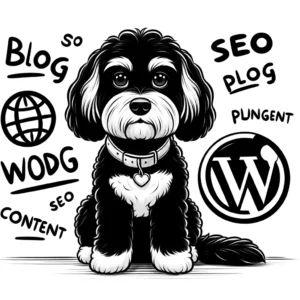Understanding CMS in WordPress
WordPress is a Content Management System (CMS) that is robust and enables users to create, manage, and publish digital content for blogs, business websites, and e-commerce without extensive coding knowledge. It is known for its user-friendly dashboard, which makes content management accessible to a wide range of users, from novices to experts.
Core Features of WordPress CMS
The WordPress CMS comes with a variety of features that facilitate the creation and management of online content. This includes a rich dashboard where users can add posts and pages effectively. The intuitive nature of the WordPress platform allows for a seamless experience, where adding content is as straightforward as using typical word processing software.
The open-source nature of WordPress offers customization through plugins, themes, and widgets. This allows for broad functionality, ranging from simple blogs to comprehensive business and ecommerce sites. Users can customize their sites with free themes or opt for premium themes that provide more sophisticated design options. WordPress plugins extend the functionalities, turning a basic website into a powerful platform capable of handling complex tasks like SEO optimization, social media integration, and contact form creation.
Blocks in the WordPress editor enable precise control over the layout and design elements within content, making the process of building and customizing websites user-friendly. The community around WordPress.org also contributes to the open-source platform by developing and maintaining a wide assortment of themes and plugins, providing endless possibilities for website design and functionality.
WordPress.com vs. WordPress.org
WordPress.com is a hosted service that simplifies the website creation process for users by managing all technical aspects such as hosting and security. It’s suitable for bloggers and businesses seeking a hassle-free solution with various plans, including free and paid options that come with additional features and support.
On the other hand, WordPress.org is the self-hosted version, which offers more flexibility and full control over your website. In this scenario, users are responsible for finding a hosting provider and managing their site’s maintenance and security. It is an ideal choice for those who wish to customize their website extensively with access to the complete repository of WordPress plugins and themes. This version is particularly favored by businesses and individuals who require a customizable and flexible platform to meet specific needs, such as running an ecommerce site or fostering a large-scale digital community.
Extending WordPress Functionality
WordPress’s ecosystem offers extensive customization options through various themes and plugins. These features enable both novice and professional developers to enhance the functionality of their WordPress websites to cater to diverse business needs.
Themes and Plugins
Themes empower users to alter the design and layout of their WordPress site with ease. A theme lays out the visual groundwork, encompassing everything from font styles to color schemes. WordPress themes are bountiful, with free and premium themes available, allowing users to select the perfect aesthetic match for their brand.
Plugins, on the other hand, extend WordPress’s capabilities beyond the basic functions. Whether a user needs to improve their site’s SEO, integrate social media, handle site security, or even create custom post types, there’s likely a plugin to fit the need. With thousands of both free and paid plugins, the WordPress plugin market provides a solution for virtually every functionality one can think of.
WordPress for Ecommerce
WooCommerce is the leading ecommerce plugin for WordPress. It transforms a basic site into a powerful online store with functionalities such as product display, shopping cart integration, and secure payment solutions. Its open-source nature encourages a community of developers to create add-ons and templates specific to the ecommerce market.
Furthermore, plugins designed for business owners enhance user experience with features like drag-and-drop builders, allowing for easy page construction without the need for code. This democratization of design and function means one can launch a professional-looking online marketplace with tools tailored to their business model. WooCommerce’s extensive APIs also offer developers the ability to create custom widget areas, customize checkout fields, and fine-tune the shopper’s experience to optimize conversions.
Managing and Maintaining a WordPress Site
Maintaining a WordPress site centers around two core elements: managing who can do what on your site, known as user roles and permissions, and handling the content effectively to ensure its visibility and effectiveness online, which includes content management and SEO.
User Roles and Permissions
In WordPress, user roles are fundamental for maintaining a secure environment where only authorized users have access to certain capabilities. These roles range from admin, which has complete site access, to subscriber, who can only manage their profile. A typical WordPress site features several predefined roles:
- Administrator: Full control of the site, including adding new users and modifying content.
- Editor: Can publish and manage posts including the posts of other users.
- Author: Can publish and manage their own posts.
- Contributor: Can write and manage their own posts but cannot publish them.
- Subscriber: Can only manage their profile.
Assigning roles responsibly is crucial to maintain the security and integrity of the website.
Content Management and SEO
A WordPress site’s content is stored and organized in a database, which makes it essential for users to manage this content effectively for consistency and scalability. Content management involves creating, editing, organizing, and publishing content. WordPress excels with a user-friendly content editor facility that facilitates these tasks, including features like scheduling posts to go live at future dates, categorizing post types – like blog posts – for better organization, and tagging for improved navigation and SEO.
SEO, or Search Engine Optimization, is crucial for making the content discoverable on search engines. WordPress aids in SEO through its clean code and the ability for users to add metadata, create search engine friendly URLs, and use plugins to optimize content. Effective use of categories and tags helps in organizing content not just for users, but also for search engines, thus enhancing visibility and driving traffic to the site.
Regular updates and backups are also part of content management to protect the website’s data against potential threats and ensure that the site can quickly recover in the event of any issue. Hosting services can assist with backups, with options available through both WordPress.com for casual users and WordPress.org for the more technically inclined and professional community. Whether running membership sites or a simple blog, these practices help maintain a reliable and efficient online presence.












